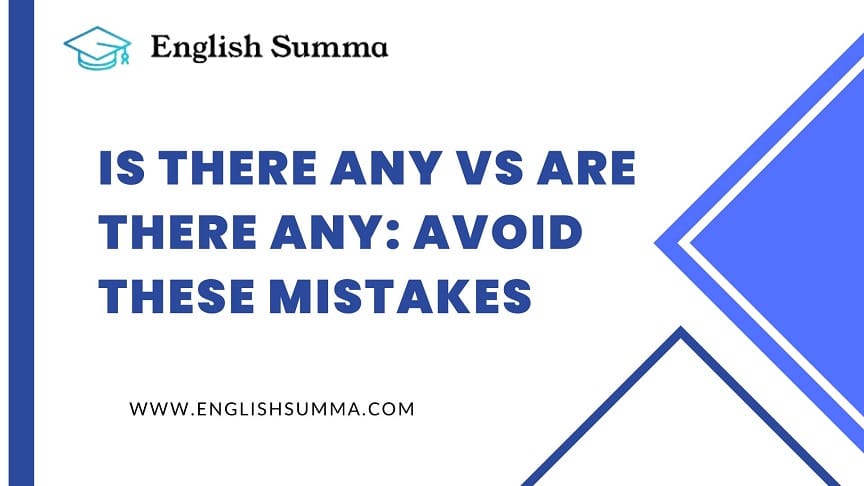The usage of “is there any” vs “are there any” in sentences often confuses English language learners. The difference lies in whether the noun is singular or plural – and if it’s countable or uncountable. By understanding this difference, you can learn to use these phrases correctly.
Is There Any
“Is there any” is used when referring to a singular or uncountable noun. For example:
- Is there any milk left in the refrigerator?
- Is there any hope of resolving this dispute?
- Is there any possibility I could get an extension on my assignment?
In these sentences, “milk”, “hope” and “possibility” are all singular, uncountable nouns. You cannot quantify or count them. Hence, we use “is there any” before the noun.
Some more examples of uncountable nouns that would use “is there any” are:
- Water
- Sand
- Air
- Love
- Sugar
Is it What Kind of or What Kinds of? Learn more in this post.
Are There Any
Alternatively, “are there any” is used when referring to plural or countable nouns – things you can quantify and count. For instance:
- Are there any cookies left in the jar?
- Are there any books on artificial intelligence in the library?
- Are there any cars available for the road trip?
In these examples, “cookies”, “books” and “cars” are all plural, countable nouns. You can count the number of cookies, books or cars present. So with a plural, countable noun, you would use “are there any” before it.
Some more examples of countable nouns requiring “are there any”:
- Apples
- Computers
- Desks
- Pens
Here is a helpful table summarizing the difference between “is there any” and “are there any”:
| Uses of | Is There Any | Are There Any |
|---|---|---|
| Used with | Singular or uncountable nouns | Plural or countable nouns |
| Example nouns | Water, hope, sand, air, love, possibility | Cookies, books, cars, apples, computers |
| Quantity | Cannot be counted or quantified | Can be counted, more than one |
| Sentence examples | Is there any milk left? | Are there any cookies in the jar? |
| Subject-verb agreement | Pairs with singular subject | Pairs with plural subject |
| Tricks | If you can add a number before the noun, use “are there any” | If you cannot add a number, use “is there any” |
Singular vs. Plural Form
Whether you use “is there” or “are there” depends on if the noun is singular or plural:
- “Is there any” + singular noun
- “Are there any” + plural noun
So if referring to one of something, use the singular form and “is there any”. If referring to more than one, use the plural form and “are there any”.
For example:
- Is there any apple in the basket? (one apple)
- Are there any apples in the basket? (multiple apples)
And for uncountable nouns which only have a singular form, always use “is there any”:
- Is there any sand on the beach? (sand can’t be pluralized)
Learn which form is correct, Of Course or Ofcourse
A Helpful Trick
Here is a simple trick to know whether to use “is there any” or “are there any”:
If you can add a number before the noun, use “are there any”. If you cannot add a number, use “is there any”.
For example:
- 10 apples –> Are there any apples?
- 10 sand –> Is there any sand? (incorrect, cannot quantify sand)
This indicates if the noun is countable/plural or uncountable/singular.
In Conclusion
- Use “is there any” for singular or uncountable nouns
- Use “are there any” for plural or countable nouns
- Singular nouns take “is there any“
- Plural nouns take “are there any”
- If you can add a number before the noun, use “are there any”
I hope these explanations and examples have helped explain the difference between “is there any” and “are there any”. Let me know if you need any clarification or have additional questions!

